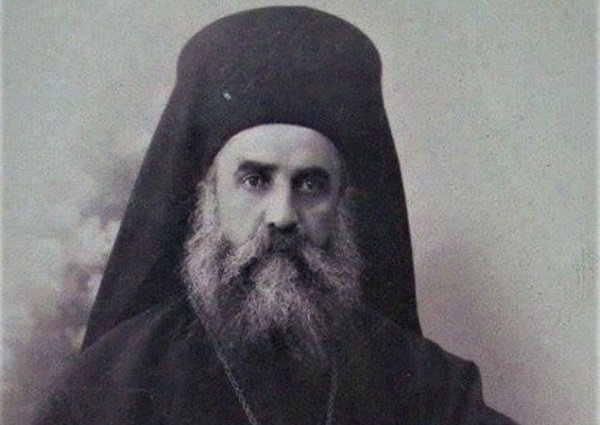As we are in the midst of Great Lent and, with the release of the wonderful movie Man of God in theaters, which I encourage you all to see, I would like to bring to your attention the beloved and popular Saint Nektarios of Aegina, Bishop of Pentapolis, the Wonderworker. We celebrate the feast days of Saint Nektarios in the month of November (November 9, his main feast day, the day of his repose in 1920) and in September (September 3, the day of the uncovering and translation of his holy relics in 1953).
Saint Nektarios is one of the most popular Orthodox Saints of the 20th century and of all time, a Saint of whom we even have photographs. He is the pride of Greece, the patron Saint of the island of Aegina near Athens, and a powerful intercessor before the Lord. He is often referred to as “the Saint of patience” due to his exemplary Christ-like life.
Saint Nektarios is also a patron Saint for students, as he has a special fondness for students, having been dean of the Rizarios Ecclesiastical School in Athens. He is also a patron Saint for those suffering from cancer. Saint Nektarios, a wonderful theologian and man of prayer, a modern Father of the Church, also had a great love for the Panagia and wrote the words to the hymn that is chanted often in church and at our various Orthodox summer camps, “Agne Parthene” (O Virgin Pure). Many miracles occurred through Saint Nektarios during his life and, even more so, after his repose, including the resurrection of a young boy. For many years, Saint Nektarios’ bodily remains were even incorrupt, meaning they had not decomposed.
Saint Nektarios was born in Selyvria in Eastern Thrace (modern-day Turkey) on October 1, 1846. After putting himself through school in Constantinople with much hard labor, he became a monk on the island of Chios in 1876. Because of his virtue, he was ordained a deacon a year later. Under the patronage of Patriarch Sophronios of Alexandria in Egypt (the ancient Patriarchate of Alexandria was founded by Saint Mark the Evangelist), he went to study theology in Athens, after which he came to Alexandria and was ordained a priest in the Cathedral of Saint Savas. After a few years, Saint Nektarios was made bishop of Pentapolis in eastern Libya, which is under the jurisdiction of the Patriarchate of Alexandria.
Unfortunately, there were clergymen who were jealous of the Saint and the love he had among the people. These clergymen spoke badly about Saint Nektarios and created gossip about him, bringing false accusations to the Patriarch himself: that he had his eye on becoming Patriarch and that he was an immoral man, going around with women. As a result of these slanders, Saint Nektarios was removed from his position and sent into exile to Greece, where the bad reputation that had been created followed him. During this whole entire time, Saint Nektarios did not once try to defend himself. Like Christ, he was silent before his accusers, exercising a superhuman patience and not caring about his reputation. In Greece, he was not even able to get a position worthy of a bishop, as he became a simple preacher on the island of Evia. The islanders there in Evia eventually realized that all the accusations against the Saint man were false.
Eventually, St. Nektarios was appointed dean of the Rizarios Ecclesiastical School in Athens. He became a spiritual guide to many people. At the request of certain women, he founded the monastery of the Holy Trinity in Aegina, where he moved in 1908. Here too Saint Nektarios received false accusations of immorality, but he did not seek revenge. On Aegina, he had saved the island from drought, healed the sick, and cast out demons. Saint Nektarios reposed in 1920 on a hospital bed in Athens. After his repose, a sweater of the Saint was placed on the bed of the sick person next to him, and the sick person was immediately healed.
In 1961, the Ecumenical Patriarchate of Constantinople officially glorified Nektarios as a Saint. In 1998, the entire council of bishops of the Patriarchate of Alexandria issued a public apology to Saint Nektarios on behalf of their predecessors for the extremely unjust treatment he received.
I pray Saint Nektarios encourages us, as I hope we can prepare ourselves through fasting, prayer, repentance, love, forgiveness, and confession (it’s good for you!), for the great celebration of our Lord’s Pascha on April 24 this year. Please remember and know: repentance means not only feeling regret over something we did or did not do but having the resolve and making the decision to do something about it and act upon this. Repentance means to change course. May we have Saint Nektarios’ prayers to change course!
May Saint Nektarios also encourage all of us in our daily lives as we encounter our own problems, setbacks, difficulties, challenges, and illnesses. May we receive inspiration from the Saint to help us keep things in perspective. May Saint Nektarios encourage us to forgive!







